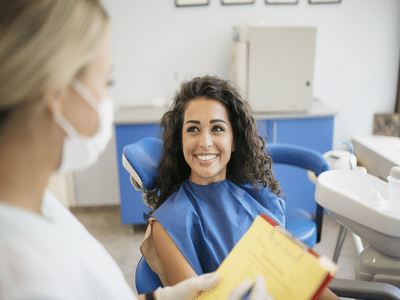
How do I take care of my appliances and my teeth?
The most important thing you can do to ensure your orthodontic treatment is successful is to take good care of your appliances and teeth. This includes brushing and flossing regularly, using a fluoride rinse, avoiding chewing on the wires or brackets, and avoiding biting cold foods.
- Brush and floss daily. You should brush twice daily with a soft-bristled toothbrush, using a gentle circular motion while applying light pressure (enough to feel the bristles on the gums). You should also floss daily using an interdental cleaner. Flossing removes plaque from between your teeth that cannot be reached by brushing alone.
- Use fluoride rinse if one is recommended by the dentist or orthodontist during treatment (you can find out more about this in our article about how dental health impacts overall health). Fluoride rinse helps prevent cavities by making it harder for plaque bacteria to stick to your teeth; this means that it takes longer for these harmful substances to develop into plaque buildup, which protects against tooth decay as well as gum disease like gingivitis or periodontal disease later on in life!
Are there any food restrictions or lifestyle changes?
This is a great question to ask your orthodontist. As you might imagine, there are some foods that can cause damage to your braces or even break them. When you have braces on you need to be careful about what type of food you eat, especially when it comes to sticky foods and chewy foods. You can’t chew on ice cubes or gum because these could cause damage from the freezing temperatures or from chewing on something hard and solid throughout the day. There are certain fruits that are hard for people with braces too like apples, carrots and bananas but most other fruits such as grapes and watermelon should do fine in moderation without breaking your brackets off your teeth!
- Avoid sticky foods: Anything sticky like gummy bears will stick around longer than normal because they don’t dissolve quickly so this means more time that could potentially damage your teeth
- Avoid crunchy foods: Crunchy snacks like chips tend not only flake off pieces of enamel (the hard outer layer) but also lead them into places where plaque can build up easily which increases chances of cavities forming down the line so avoid this by going for softer alternatives instead such as pretzels instead!
What Do My Treatment Timeline and Costs Look Like?
You’ll want to know the length of time your orthodontic treatment will take, as well as what it’s going to cost. The most important thing you can do is go over your insurance coverage (or lack thereof) with your orthodontist so that he or she can give you an accurate assessment of how much treatment will cost out-of-pocket. Your orthodontist will also be able to tell you what kinds of discounts are available for military families and others who qualify for special pricing.
What are Some Different Types of Treatment?
An orthodontist is an orthodontic expert, oral surgeon, or dentist who focuses on correcting dental issues such as crooked teeth. This can include help with jaw alignment, overbite, underbite, and more. An orthodontist may be called upon to treat issues such as crowding or spacing between the teeth in order to create a more pleasing smile for patients who wish to do so.
Your orthodontist is well-equipped to outline all of the treatment types that make sense for your specific case. Some of those options may be traditional metal braces, ceramic braces, or Invisalign.
We hope that these questions help you to figure out what you need from your orthodontist and make sure the whole process goes smoothly. If you have any questions we didn’t answer here, or just want more information, feel free to contact us and schedule a consultation!